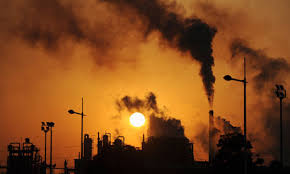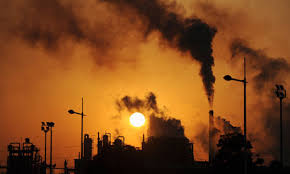
According to a survey of 750 experts conducted by the world Economic Forum, a catastrophe caused by climate change is seen as the biggest potential threat to the global economy in 2016.
Global warming had catapulted its way to the top of the list of concerns which became evident at the annual assessment of risks conducted by the WEF before its annual meeting in Davos on 20-23 January.
In the first time in the 11 years of the Global Risks report that the environment has been in first place, the organization noted that a failure of climate change mitigation and adaptation was seen as likely to have a bigger impact than the spread of weapons of mass destruction, water crises, mass involuntary migration and a severe energy price shock.
Inter-connections between risks were becoming stronger, noted the report that was prepared by the WEF in collaboration with risk specialists Marsh & McLennan and Zurich Insurance Group. Noting that these often had “major and unpredictable impacts”, the report cited links between climate change and involuntary migration or international security.
There was a risk of Europe fragmenting as a result of “people on the move”, said Espen Barth Eide, the WEF’s head of geopolitical affairs.
“I am concerned about the continued support in national politics for keeping Europe together,” said Eide at a press conference in London while launching the report.
The report warned of “profound effects on Europe’s politics and its economy”, and a knock-on impact on the rest of the world if enough countries decided to pursue a non-integrated approach to coping with migration.
“If things unravel at the core, what does it mean in other parts of the world?” Eide said.
“Climate change is exacerbating more risks than ever before in terms of water crises, food shortages, constrained economic growth, weaker societal cohesion and increased security risks,” Cecilia Reyes, Zurich’s chief risk officer said.
The WEF said the broad range of risks – from environmental to geopolitical and economic – was unprecedented.
With global average surface temperatures increasing by more than 1C over pre-industrial levels for the first time, and the number of forcibly displaced people at 59.5 million, the risks appeared to be rising, WEF added. This number of displaced persons is almost 50% more than in 1940, when the second world war was being fought.
“Data from the report appears to support the increased likelihood of risks across the board, with all 24 of the risks continuously measured since 2014 having increased their likelihood scores in the past three years,” the WEF said.
“Events such as Europe’s refugee crisis and terrorist attacks have raised global political instability to its highest level since the cold war,” said John Drzik, president of Marsh Global Risk and Specialties.
“This is widening the backdrop of uncertainty against which international firms will increasingly be forced to make their strategic decisions. The need for business leaders to consider the implications of these risks on their firm’s footprint, reputation and supply chain has never been more pressing,” added Drzik.
(Source:www.theguardian.com)
Global warming had catapulted its way to the top of the list of concerns which became evident at the annual assessment of risks conducted by the WEF before its annual meeting in Davos on 20-23 January.
In the first time in the 11 years of the Global Risks report that the environment has been in first place, the organization noted that a failure of climate change mitigation and adaptation was seen as likely to have a bigger impact than the spread of weapons of mass destruction, water crises, mass involuntary migration and a severe energy price shock.
Inter-connections between risks were becoming stronger, noted the report that was prepared by the WEF in collaboration with risk specialists Marsh & McLennan and Zurich Insurance Group. Noting that these often had “major and unpredictable impacts”, the report cited links between climate change and involuntary migration or international security.
There was a risk of Europe fragmenting as a result of “people on the move”, said Espen Barth Eide, the WEF’s head of geopolitical affairs.
“I am concerned about the continued support in national politics for keeping Europe together,” said Eide at a press conference in London while launching the report.
The report warned of “profound effects on Europe’s politics and its economy”, and a knock-on impact on the rest of the world if enough countries decided to pursue a non-integrated approach to coping with migration.
“If things unravel at the core, what does it mean in other parts of the world?” Eide said.
“Climate change is exacerbating more risks than ever before in terms of water crises, food shortages, constrained economic growth, weaker societal cohesion and increased security risks,” Cecilia Reyes, Zurich’s chief risk officer said.
The WEF said the broad range of risks – from environmental to geopolitical and economic – was unprecedented.
With global average surface temperatures increasing by more than 1C over pre-industrial levels for the first time, and the number of forcibly displaced people at 59.5 million, the risks appeared to be rising, WEF added. This number of displaced persons is almost 50% more than in 1940, when the second world war was being fought.
“Data from the report appears to support the increased likelihood of risks across the board, with all 24 of the risks continuously measured since 2014 having increased their likelihood scores in the past three years,” the WEF said.
“Events such as Europe’s refugee crisis and terrorist attacks have raised global political instability to its highest level since the cold war,” said John Drzik, president of Marsh Global Risk and Specialties.
“This is widening the backdrop of uncertainty against which international firms will increasingly be forced to make their strategic decisions. The need for business leaders to consider the implications of these risks on their firm’s footprint, reputation and supply chain has never been more pressing,” added Drzik.
(Source:www.theguardian.com)





